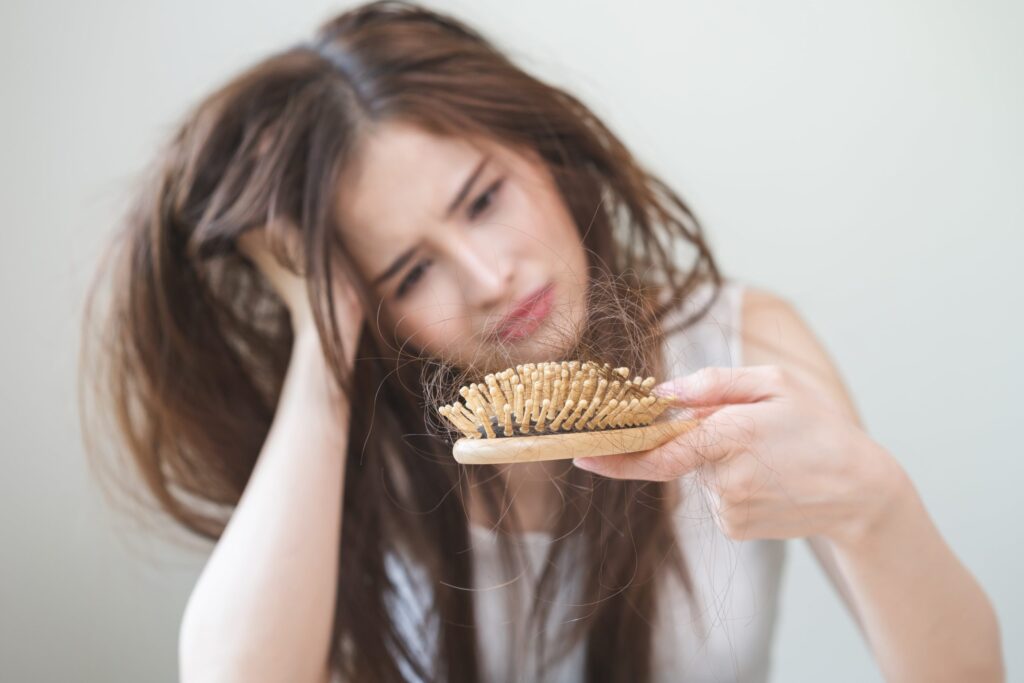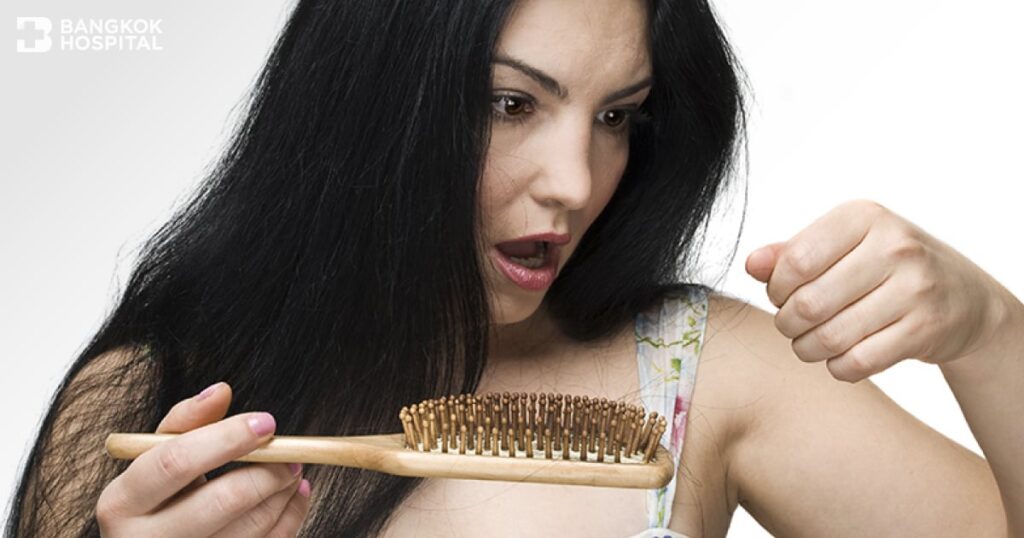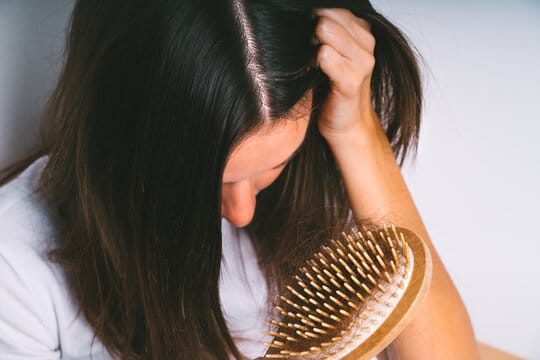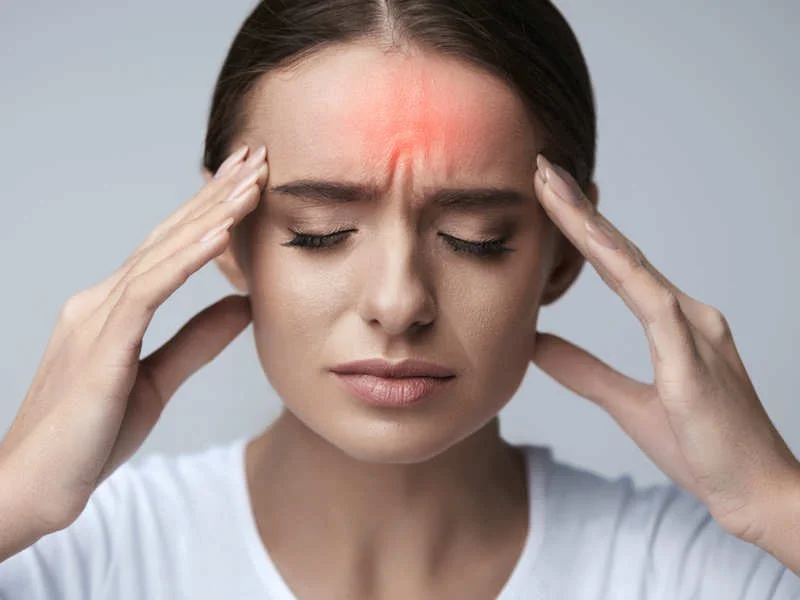
It’s common to lose around 100 hairs per day because of the typical growth cycle. If you’re losing more than that, talk with a doctor to rule out any underlying medical conditions before exploring your options.
A quick look at our hair loss prevention categories
- Changes to your diet | Skip to section
- Supplements to consider | Skip to section
- New hair care routines | Skip to section
- Medical treatments | Skip to section
- Over-the-counter and prescription medications | Skip to section
- Other methods to consider | Skip to section
- What causes your hair to fall out? | Skip to section
Many people consider a full, healthy head of hair central to their appearance and self-confidence. If your hair begins to thin or fall out, that can be distressing. But you might find it helpful to know that there are several things you can do to help prevent hair loss or encourage hair growth.
The best way to slow or stop hair loss is to find and address the underlying cause. Hair loss stemming from factors such as childbirth, surgery, and stress can be temporary in some cases — a condition called telogen effluvium.
But in other cases, it’s a little more complicated.
In this article, we break down 22 tips that can help stop hair loss. We also explore some frequently asked questions.
Changes to your diet
1.Mediterranean diet
The results of a 2017 study suggest that a diet that includes raw vegetables and fresh herbs, such as the Mediterranean diet, may reduce the risk of androgenic alopecia (female pattern baldness or male pattern baldness) or slow its onset.
The best results were observed when participants consumed large amounts of raw vegetables and fresh herbs — such as parsley, basil, and salad greens — more than 3 days per week.
2.Protein
Hair follicles are made up mostly of a protein called keratin. In one 2017 studyTrusted Source of 100 people with hair loss, the authors noted several nutritional deficiencies in participants, including deficiencies of amino acids that serve as the building blocks of protein.
While researchers note that more studies are neededTrusted Source on the subject, a protein-rich diet may help prevent hair loss. Healthy protein options include:
- eggs
- nuts
- beans and peas
- fish
- low-fat dairy products
- chicken
- turkey
3.Vitamin A
Vitamin A is partly made up of retinoids, which support healthy hair growthTrusted Source and influence the hair cycle. But it’s dose-dependent, meaning that consuming too much — or too little — can damage your hair.
It’s unlikely that you’ll get too much vitamin A from dietary sources. So, fill your plate with foods rich in vitamin A, such as sweet potatoes, sweet peppers, and spinach.

Supplements to consider
4.Multivitamin
A 2018 research review notes that the following vitamins and minerals are important for hair growth and retention — specifically for cell turnover:
- vitamins A, B, C, and D
- iron
- selenium
- zinc
You can find daily multivitamins at most grocery stores or drugstores or ask your doctor to prescribe one for you.
5.Vitamin D
Some research, including a 2024 review Source, suggests that there may be a connection between vitamin D deficiency and alopecia. Although more research is needed, it’s possible that treating this deficiency could help with hair regrowth.
6.Biotin
Biotin — also known as vitamin H or B7 — is involved in fatty acid production in your body. This process is essential to the life cycle of hair, and you may experience hair loss if you have a biotin deficiency.
7.Saw palmetto
Derived from the fruit of American dwarf pine trees, this herb may help maintain levels of testosterone.
A 2020 review of seven studies suggests that saw palmetto doses of 100–320 milligrams taken once or twice daily could help with hair quality, hair count, and hair density.
The authors concluded that saw palmetto may be helpful for people with androgenetic alopecia, telogen effluvium, and self-perceived hair thinning.
8.Ginseng
Ginseng contains certain phytochemicals that may promote hair growth on your scalp. But further research is needed to recommend specific dosages.
In the meantime, talk with your doctor before adding ginseng supplements to your diet.

New hair care routines
9.Regular washing
Washing your hair daily may protect against hair loss by keeping your scalp healthy and clean. The key is to use a mild shampoo. Harsher formulas may dry out your hair and cause it to break, leading to hair loss.
10.Coconut oil
A 2019 review suggests that coconut oil may help prevent hair damage from grooming and UV light exposure.
The lauric acid found in coconut oil helps bind proteinTrusted Source in hair, protecting it from breakage at the root and strand. Massaging coconut oil into your scalp may promote better blood flow and help with regrowth.
11.Olive oil
Olive oil can be used to deeply condition hair, protecting it from dryness and associated breakage. Olive oil is also a central component of the Mediterranean diet, which may help slow down genetic hair loss.
You may want to try applying a couple of tablespoons of olive oil directly to your hair and letting it sit for 30 minutes before washing it out.
12.Gentle styling
Skip tight braids or ponytails that may pull on your hair at the root and potentially lead Trusted Source to excessive shedding.
While you’re at it, let your hair air-dry to avoid irritating your scalp. If you can, avoid heat-styling tools such as curling or straightening irons, which may also damage or break the hair shaft.
13.Hair processing
Chemical treatments such as perms and hair dyes may also damage your hair and scalp.
Ask your stylist about alternatives, such as organic hair dyes and other products that don’t contain ammonia, peroxide, or para-phenylenediamine (PPD).
Medical treatments
14.Laser therapy
Low-level lasers may help improve hair density in people with genetic hair loss or hair loss due to chemotherapy. This procedure, also called red light therapy, may work by stimulating epidermal stem cells.
You can find home laser devices on the market. You may need to use the device regularly to see results.
15.Platelet-rich plasma
Getting platelet-rich plasma (PRP) injections into your scalp can help stimulate growth in areas already affected by hair loss. During this procedure, blood is run through a centrifuge to separate the platelets and then injected into your scalp.
In a small 2014 study, 11 participants saw 30% more trusted Source growth in thinning areas after 4 PRP sessions. Pricing ranges from $1,500 to $3,500 for your first 3 treatments, and it’s unlikely to be covered by insurance.
Over-the-counter and prescription medications
16.Minoxidil
Also known as Rogaine, this over-the-counter drug is known to help with hair loss.
Apply the liquid or foam to your scalp each day. Possible side effects include scalp irritation and acne at the site of application. Rarer side effects include irregular heartbeat and blurred vision.
17.Finasteride
Also known as Propecia, this prescription pill may helpTrusted Source slow down hair loss and even promote new growth.
However, you may need to use the medication for as long as 12 months before you’ll see any results. It also has various side effects, including loss of libido and erectile dysfunction.
People who are pregnant or may become pregnant should avoid this medication.
18.Phenylephrine
Topical phenylephrine may help with hair loss due to styling by stimulating the follicle muscles to contract. This makes it harder to pull out hairs during brushing, for example.
However, topical phenylephrine isn’t yet publicly available. Scientists have developed a specific formula called AB‐102Trusted Source, but it has not been released.
Other methods to consider
19.Essential oils
Essential oils may help reduce hair loss.
A 2020 review Source noted that various essential oils, including chamomile, thyme, and tea tree oils, could improve conditions such as alopecia areata, androgenetic alopecia, and psoriatic alopecia.
Other essential oils to consider include lavender, lemongrass, and peppermint. You can try mixing a couple drops of any or all of these oils with a couple of tablespoons of carrier oil such as jojoba or grapeseed. Apply it to your scalp for 10 minutes before washing.
But make sure to do a patch test before using essential oils on larger areas of your skin. It’s possible to be allergic to essential oils.
20.Onion juice
People with alopecia areata may see regrowth after applying crude onion juice to their scalp twice per day.
While research on this remedy is limited, the juice did appear to promote hair growth in 20 of the 23 participants Source who tried it in a small 2002 study. Scientists believe that the potential hair-growing properties may be related to the onion’s sulfur content.
21.Massage
We know scalp massage feels good, but can it help grow your hair too? Maybe.
In one small 2016 studyTrusted Source involving 9 people, participants saw results after receiving as little as 4 minutes of massage a day for 24 weeks.
22.Yoga
Hair loss caused by stress may respond well to yoga. You may want to try these stress-relieving yoga poses to help prevent or slow down hair loss:
- Downward-Facing Dog
- Forward Bend
- Camel Pose
- Shoulderstand
- Fish Pose
- Kneeling Pose
What causes your hair to fall out?
The hair on your head goes through a life cycle that involves growth, resting, and shedding. It’s common to lose up to 100 hairs per day.
But if you experience more sudden loss, loss in patches, or overall thinning, you may want to see a doctor.
Some shedding is temporary and may respond well to dietary changes, certain treatments, or lifestyle strategies. Other hair loss may be more permanent or may not stop until an underlying condition is treated.
Other causes of hair loss include:
- Medical conditions such as alopecia areata, scalp infections, or trichotillomania (hair-pulling disorder)
- Hormonal changes due to pregnancy, childbirth, menopause, or thyroid issues
- Medications or supplements such as those used for cancer, high blood pressure, depression, or arthritis
- Radiation treatment for conditions such as cancer
- Stress, which may be physical or emotional
- Styling practices such as wearing tight hairstyles






Thank you for your post. I really enjoyed reading it, especially because it addressed my issue. It helped me a lot and I hope it will also help others.
Thank You.. Your valuable comments are our pleasure. Please share our website with your friends.
How can I find out more about it?
Thank you.. Your valuable comments are our pleasure. Please share our website with your friends. Please tell us any health problems you or a friend have. We will try to provide solutions for that
Your articles are extremely helpful to me. Please provide more information!
Thank you.. Your valuable comments are our pleasure. Please share our website with your friends.
Thank you for writing this article. I appreciate the subject too.
Thank you.. Your valuable comments are our pleasure. Please share our website with your friends.
Thank you for writing this post!
Thank you.. Your valuable comments are our pleasure. Please share our website with your friends.
You’ve been great to me. Thank you!
Thank you.. Your valuable comments are our pleasure. Please share our website with your friends.
Thank you for your articles. They are very helpful to me. May I ask you a question?
Sure..
Thank you for being of assistance to me. I really loved this article.
Thank you.. Your valuable comments are our pleasure. Please share our website with your friends.
Thank you for sharing this article with me. It helped me a lot and I love it.
Thank you.. Your valuable comments are our pleasure. Please share our website with your friends.
May I request more information on the subject? All of your articles are extremely useful to me. Thank you!
Thank you.. Your valuable comments are our pleasure. Please share our website with your friends.
Thank you for writing this post. I like the subject too.
Thank you.. Your valuable comments are our pleasure. Please share our website with your friends.
Hi! I just wanted to ask if you ever have any trouble with hackers? My last blog (wordpress) was hacked and I ended up losing many months of hard work due to no data backup. Do you have any methods to prevent hackers?
It’s best to take part in a contest for probably the greatest blogs on the web. I’ll advocate this site!
Good day! This is kind of off topic but I need some guidance from an established blog. Is it difficult to set up your own blog? I’m not very techincal but I can figure things out pretty quick. I’m thinking about creating my own but I’m not sure where to begin. Do you have any ideas or suggestions? Cheers
Search via youtube
Great goods from you, man. I’ve understand your stuff previous to and you are just too magnificent. I really like what you’ve acquired here, really like what you’re stating and the way in which you say it. You make it enjoyable and you still care for to keep it sensible. I can’t wait to read far more from you. This is actually a wonderful site.
Thank you.. Your valuable comments are our pleasure. Please share our website with your friends.
Hello! This is kind of off topic but I need some advice from an established blog. Is it very difficult to set up your own blog? I’m not very techincal but I can figure things out pretty quick. I’m thinking about setting up my own but I’m not sure where to begin. Do you have any points or suggestions? Cheers
Hey there! Would you mind if I share your blog with my myspace group? There’s a lot of folks that I think would really enjoy your content. Please let me know. Thanks
I savour, cause I found just what I was taking a look for. You have ended my four day lengthy hunt! God Bless you man. Have a great day. Bye
Hi there, I found your website by way of Google even as looking for a related matter, your website came up, it looks good. I have bookmarked it in my google bookmarks.
Hello there! This is my first visit to your blog! We are a team of volunteers and starting a new project in a community in the same niche. Your blog provided us beneficial information to work on. You have done a wonderful job!
Thanks for the tips shared in your blog. Something else I would like to express is that weight-loss is not about going on a celebrity diet and trying to lose as much weight as possible in a couple of days. The most effective way to shed pounds is by consuming it slowly and gradually and following some basic tips which can make it easier to make the most from a attempt to shed pounds. You may be aware and be following some of these tips, yet reinforcing information never hurts.
You are a very bright person!